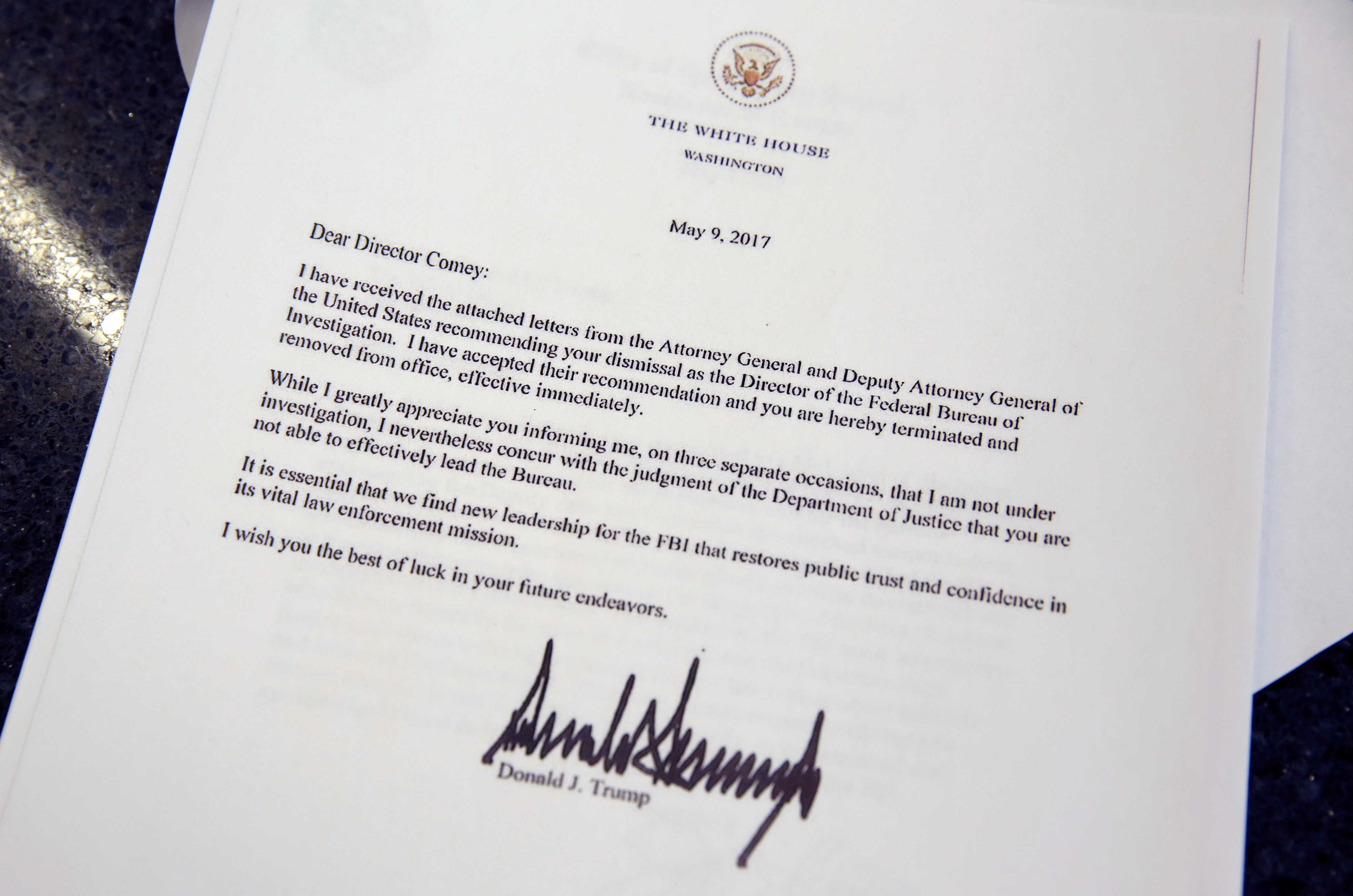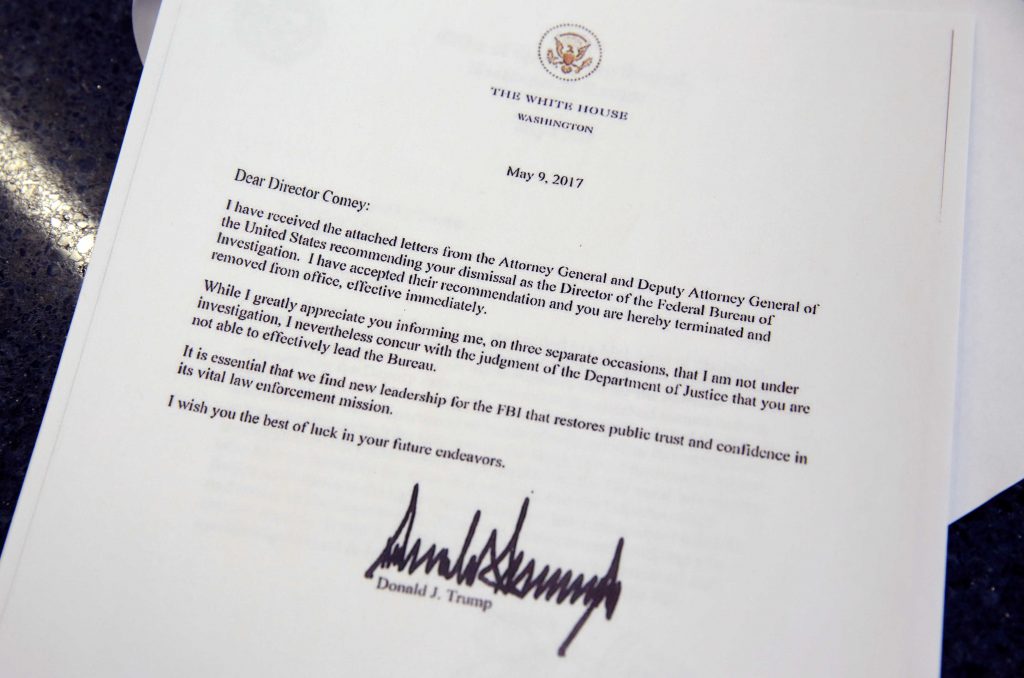 President Donald Trump fired FBI director James Comey on May 9. Comey had been leading a criminal investigation into whether Trump’s advisers colluded with the Russian government to influence the results of the 2016 presidential election. Trump justified the firing by pointing to the way Comey handled the investigation into Hillary Clinton’s private email server, although many talking heads don’t buy it. Comey’s firing has set off huge fights on the right and left, and some analysts see a coming crisis. Stepping back from the domestic fray, we asked Atlantic Council experts and UkraineAlert contributors the following question: what does Comey’s firing mean for getting to the bottom of Russian interference in the 2016 US presidential election? Is it a step forward or back, and what should we be watching for?
President Donald Trump fired FBI director James Comey on May 9. Comey had been leading a criminal investigation into whether Trump’s advisers colluded with the Russian government to influence the results of the 2016 presidential election. Trump justified the firing by pointing to the way Comey handled the investigation into Hillary Clinton’s private email server, although many talking heads don’t buy it. Comey’s firing has set off huge fights on the right and left, and some analysts see a coming crisis. Stepping back from the domestic fray, we asked Atlantic Council experts and UkraineAlert contributors the following question: what does Comey’s firing mean for getting to the bottom of Russian interference in the 2016 US presidential election? Is it a step forward or back, and what should we be watching for?
Jeffrey Gedmin, Senior Fellow at the Atlantic Council and Georgetown University’s School of Foreign Service, and Senior Adviser at Blue Star Strategies: Just how many gifts can the United States bestow upon Russian President Vladimir Putin?
The prospect of an honest, independent, and credible investigation into whether Trump campaign aides had ties to Russian intelligence just got harder. So, too, our ability to focus on the main event. Whether there’s fire behind the smoke of 2016 or not, we Americans—Democrats, Republicans, Independents, and others—have a Russia problem.
No, Vladimir Putin is not ten feet tall. He presides over a middling power with a weak economy, miserable health care, and dilapidated infrastructure. But the man knows how to play offense. And in his clinical KGB sort of way, he pinpoints his opponent’s vulnerability. Putin is the scrappy, under-sized point guard who weaves, pump fakes, pivots—and picks a defense apart.
What is this really about?
There’s an adversarial power that wants us bickering and bogged down, divided and distrustful of our own politics. His propaganda tells the world 24/7 that democracy is a dead end; the Americans, a dysfunctional, squabbling mess who cannot be counted on.
Must we continue to oblige?
Clint Watts, former FBI agent and Robert A. Fox Fellow at the Foreign Policy Research Institute: While FBI agents are notoriously independent in their investigations and will plow forward, they most certainly feel the implicit message in Comey’s firing—suppress the Russia investigation.
Investigators must have concerns about the impartiality of the Department of Justice appointees through which investigative steps must be requested, coordinated, and potentially advanced to an indictment. The Russia investigation is now slowed at best and at worst could be stopped by a Trump crony pushed in as the new FBI director. Moving forward, we should monitor the Department of Justice’s focus. If they obsess over intelligence leak investigations over Russian meddling, we will know that Trump’s power has overtaken the rule of law.
Comey’s firing also comes at a detrimental time for European allies. While France resisted Russian influence at the polls last weekend, German elections are slated for the fall. Germany faces a stiffer challenge than France. Russia has better German-language capability, more alt-right support, and anti-immigration influence in Germany than it did in France. Trump’s disruptive behavior only eases Russia’s ability to conduct influence operations in United States and Europe.
Edward Lucas, Senior Editor, The Economist: Plenty of reasons to fire Comey, but not like this. If Donald Trump thought this would abate the row, it was (another) misjudgment. It will strengthen the case for a full investigation. However, the White House is all but impregnable with a friendly Congress. This row will be debilitating not deathly.
Steve LeVine, Future Editor, Axios and Future Tense Fellow at New America Foundation: Step forward though with much wrangling to be expected. Democrats and a couple of Republicans will now dig in and insist on a serious accounting. But it’s the wild cards that make this harder now for Trump, and the prospect of or answers better—FBI agents will leak, furious with Trump’s messing with the integrity of the system. We may even see Trump’s taxes.
Anders Åslund, Senior Fellow at the Atlantic Council: By sacking the director of the FBI, Trump increased suspicions that he was personally guilty of collusion with Russia in the US presidential election campaign. The question has changed from if there was collusion to how the collusion was carried out. The two key suspects are Trump’s former campaign manager Paul Manafort and his adviser Roger Stone, who have all the relevant contacts and skills.
Trump looks all the more suspect by receiving Russia’s Foreign Minister Sergei Lavrov immediately after firing Comey and only allowing Russian state photographers in the Oval Office to capture the meeting. No official duty compelled Trump to hold such a meeting. The president’s loyalty to the United States of America is effectively being questioned by his own actions.
This case needs to be investigated thoroughly and expediently. How long can the Republican Party support him? The longer they do, the worse they are likely to suffer in the 2018 elections. Comey’s sacking looks like a desperate step that seriously undermines the president’s political and moral standing.
And on Twitter, Madeleine Albright, former US Secretary of State, weighed in: The world is watching how America responds to the Comey crisis. Let’s prove we are a real democracy through a truly independent investigation.
Melinda Haring is the editor of the UkraineAlert blog at the Atlantic Council. She tweets @melindaharing.
Image: This picture shows a copy of the letter by US President Donald Trump firing Director of the FBI James Comey at the White House in Washington, May 9, 2017. REUTERS/Joshua Roberts
